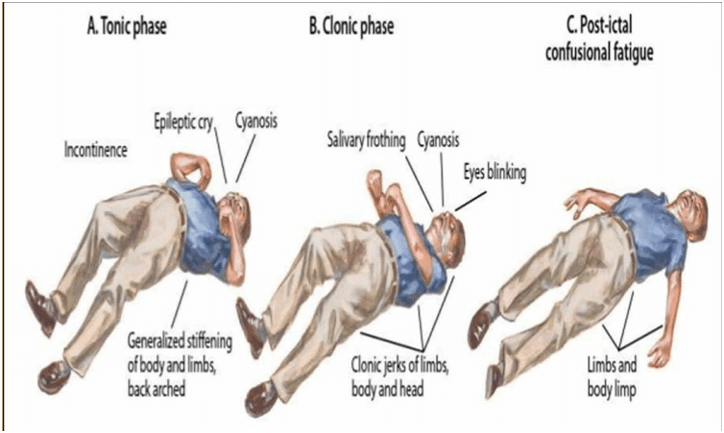A nurse is caring for a 3-year-old child immediately following a tonic-clonic seizure.
Which of the following actions should the nurse take?
Offer the child sips of clear fluids.
Place the child in a supine position.
Administer an oral antiepileptic medication.
Check the child for oral injuries.
The Correct Answer is D
After a tonic-clonic seizure, the nurse should first check the child for any injuries, particularly in the oral cavity. This is because during a seizure, the child's tongue may have been biten, or there may be other oral injuries. Therefore, it is essential to check the oral cavity for any injury or bleeding.

Nursing Test Bank
Naxlex Comprehensive Predictor Exams
Related Questions
Correct Answer is C
Explanation
The client is experiencing palpitations and a sense of impending doom, which may indicate a heightened state of anxiety or a panic attack. Minimizing environmental stimuli can help create a calming and safe environment for the client. By reducing noise, bright lights, and other potentially distressing stimuli, the nurse can create a more soothing atmosphere that may help alleviate the client's anxiety.
While exploring behaviors that have helped to reduce the client's anxiety in the past and explaining to the client that anxiety causes physical manifestations are important actions, they may not provide immediate relief or address the client's immediate distress.
Administering an anti-anxiety medication may be considered if the client's symptoms persist or worsen, but it is not the first action to be taken. The nurse should prioritize non-pharmacological interventions and create a supportive environment before considering medication administration.
Correct Answer is C
Explanation
Sponge baths are recommended until the umbilical cord stump falls off, which typically occurs within the first two weeks of life. After that, the baby can be immersed in water for a regular bath. Using talcum powder is not recommended as it can be harmful to the baby's respiratory system if inhaled. Mild, pH-balanced soap should be used instead of alkaline soap to avoid irritating the baby's delicate skin. The bathwater temperature should be around 98 degrees Fahrenheit and not hoter than 100 degrees Fahrenheit to prevent burns.

Whether you are a student looking to ace your exams or a practicing nurse seeking to enhance your expertise , our nursing education contents will empower you with the confidence and competence to make a difference in the lives of patients and become a respected leader in the healthcare field.
Visit Naxlex, invest in your future and unlock endless possibilities with our unparalleled nursing education contents today
Report Wrong Answer on the Current Question
Do you disagree with the answer? If yes, what is your expected answer? Explain.
Kindly be descriptive with the issue you are facing.
